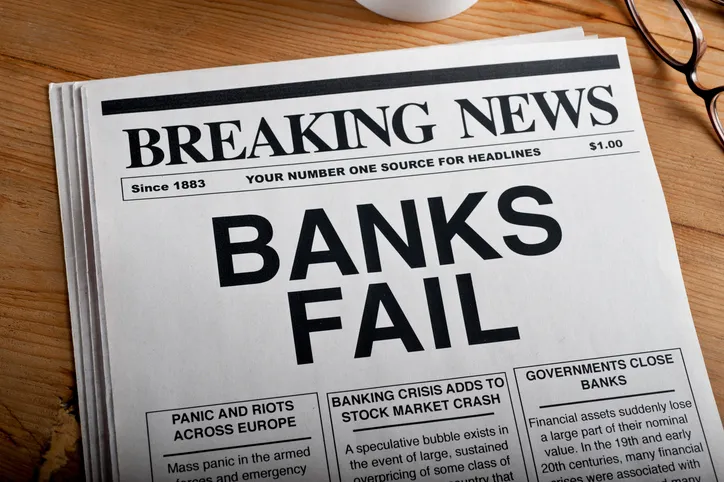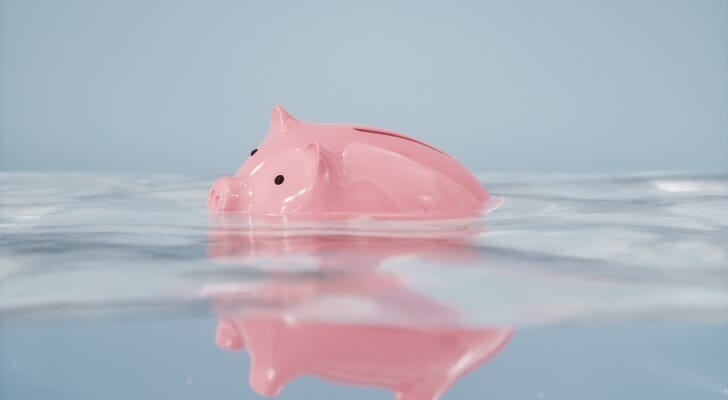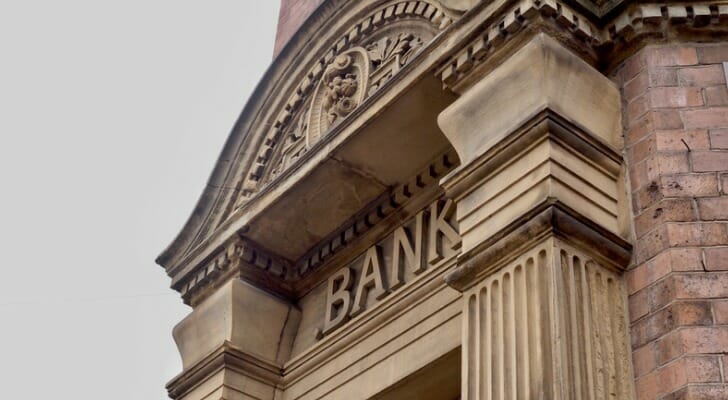During times of economic uncertainty, it’s common to question the stability of banks and the overall banking system. After all, your bank plays a vital role in safeguarding your money, ensuring you can pay bills, manage everyday expenses and plan for the future. Concerns about what could happen in the event of a bank failure are valid. The good news is, that are protections in place to safeguard your deposits. We’ll cover what happens when a bank fails, why it happens and how it can impact you. Additionally, consulting with a financial advisor can help you take proactive steps to minimize risks to your investments and create a more resilient financial plan.
Bank Failure, Explained
A bank failure means that a bank is no longer able to keep up with its financial obligations to depositors (that means you) and creditors. When a bank fails, it can be shut down by federal or state regulators. In some cases, another bank may move in and purchase the bank’s assets and accounts.
Bank failures are not a common occurrence. The 2008 financial crisis and the subsequent recession saw a spike in the number of failed banks. In 2010 alone, 157 banks went out of business. But those failures are the exception, rather than the rule.
Why Banks Fail

There are different reasons why a bank failure can happen. First, it’s important to understand a little about how banks work.
When you deposit money into your bank account, it doesn’t necessarily end up sitting in the bank’s vault. Instead, the bank uses some of the money from depositor accounts to make loans and investments. The assumption is that those investments will be profitable, allowing the bank to be able to meet its obligations when depositors decide to withdraw cash.
A bank failure can happen if those investments don’t pay off as expected and the bank suddenly doesn’t have the money to pay its depositors back. This is largely what happened in 2008. Banks had invested heavily in mortgage-backed securities and when those securities when belly up, so did the projected profits on those investments. That, in turn, triggered a wave of bank failures.
The key marker of a bank failure is insolvency. When a bank has more money paid out in investments than it does on hand to pay depositors, it’s considered a failure.
What Happens When a Bank Fails
If a bank is failing or in danger of failing, it can try to dig its way out first before calling it quits. For example, the bank may attempt to get a loan to cover its obligations to its depositors. This creates new debt for the bank but it can also help avoid something worse: a bank run.
A bank run happens when depositors panic and start withdrawing cash from the bank. If the bank doesn’t have the cash to cover those withdrawals, then it can be forced to close its doors. (Think about George Bailey from “It’s a Wonderful Life”.)
What happens next depends on whether the bank is insured, as most banks are, by the Federal Deposit Insurance Corporation (FDIC). The FDIC protects the money you keep in a covered bank, up to a certain limit. If a bank fails, the FDIC can step in and do one of two things. It can either sell the bank to a bank that has the capital to purchase it, or it can take over the operation of the bank itself.
If the bank is sold, then the purchasing bank becomes your new bank. If the FDIC takes the reins then, for the most part, it should be business as usual when it comes to things like using your debit card to make purchases or scheduling bill payments. The bank may be closed temporarily for just a few days while the FDIC sorts things out. For example, the bank may be shut down on a Friday afternoon and reopen Monday morning to minimize disruptions for customers.
Can You Lose Money in a Bank Failure?
This might be your biggest concern and no one wants to see their checking account or savings account balance disappear because the bank dropped the ball. This was one of the main concerns of Americans during the Great Depression. The good news is that as long as your bank is FDIC-insured, your money is safe.
Here’s exactly how the FDIC protects your money. The standard insurance covers you dollar-for-dollar up to $250,000 for a single ownership account, per bank. If you co-own a joint account, then you’re jointly covered by the same $250,000 limit.
Those limits include both your original deposits and the interest accrued on those deposits. The types of accounts the FDIC covers include:
- Checking accounts
- Negotiable Order of Withdrawal (NOW) accounts
- Savings accounts
- Money Market Deposit Accounts (MMDAs)
- Time deposits such as certificates of deposit (CDs)
- Cashier’s checks, money orders, and other official items issued by a bank
- Revocable and irrevocable trust accounts
- Certain retirement accounts, including traditional and IRAs
Limits and Other Considerations
You’ll notice that stocks, mutual funds and other investments are not covered. Neither are life insurance or annuity plans. The FDIC only covers products issued by banks, not investment firms or insurance companies.
It’s also important to note that the limits apply per depositor, per bank. So if you have five different accounts at the same bank totaling $300,000 in all, only $250,000 of that money would be covered if they’re all the same account ownership type. But you could still recoup the remaining money if the FDIC is able to sell off the bank’s assets.
If you have money at an FDIC-insured bank that fails, the FDIC automatically steps in to pay you back, up to the covered limits. Typically, the FDIC pays insurance within a few days of a bank closing its doors either by sending you a check or giving you a new account at another bank. There’s nothing you need to do to be covered by FDIC insurance, other than keeping your money at an FDIC-insured bank. The FDIC offers a helpful online tool that you can use to search your bank’s coverage status.
Bottom Line

Bank failures don’t happen every day, and they’re not something you need to be overly concerned with. If you’re doing business with a bank that’s FDIC-insured then you’re still protected even if the bank were to fail for some reason. And if your current bank isn’t FDIC-insured you could always consider switching to a bank that is for your peace of mind.
Tips for Investing
- While the FDIC protects your deposits, a financial advisor can help you minimize risk to your investments. Finding a financial advisor doesn’t have to be hard. SmartAsset’s free tool matches you with up to three vetted financial advisors who serve your area. You can have a free introductory call with your advisor matches to decide which one you feel is right for you. If you’re ready to find an advisor who can help you achieve your financial goals, get started now.
- If you keep your money at a credit union instead of a bank, you may be wondering whether those accounts are covered, as well. Credit unions aren’t covered by the FDIC. Instead, they’re insured by the National Credit Union Association (NCUA). The NCUA offers the same coverage limit of $250,000 per depositor, per institution, per ownership category.
Photo credit: ©iStock.com/Victorburnside, ©iStock.com/KLH49, ©iStock.com/imaginima
